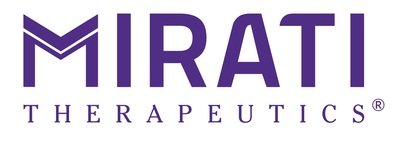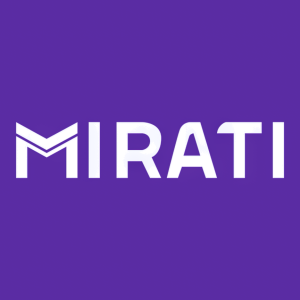Mirati Presents Two-Year Follow-Up Data from KRYSTAL-1 Study Demonstrating Durable Response and Long-Term Overall Survival at 2023 World Conference on Lung Cancer
- Adagrasib demonstrated durable efficacy with a median overall survival of 14.1 months and a 2-year OS rate of 31%
- Clinical benefit observed in patients with treated CNS metastases and baseline co-mutations
- Low rate of grade >3 hepatotoxicity
- None.
Insights
Analyzing...
In the pooled analysis, adagrasib demonstrated durable efficacy with a median overall survival (OS) of 14.1 months and a 2-year OS rate of
In the study, adagrasib demonstrated a manageable long-term safety profile with low grade treatment-related adverse events (TRAEs). Hepatotoxicity was not observed in any patients who received adagrasib within 30 days of prior immunotherapy and, overall, there was a low rate of grade >3 hepatoxicity.
A confirmatory Phase 3 study, KRYSTAL-12, is ongoing, evaluating adagrasib vs. docetaxel in previously treated patients with KRASG12C-mutated NSCLC.
"This data reinforces the ability of adagrasib to positively impact patients as a potential best in class option," said Alan Sandler, M.D., chief medical officer, Mirati Therapeutics, Inc. "Adagrasib offers a differentiated option for KRASG12C-mutated NSCLC as evidenced by its clinical activity in the CNS and ability to sequence adagrasib immediately after prior immunotherapy. We look forward to continuing to advance adagrasib across lines of therapy in a range of tumor types for the benefit of patients living with KRASG12C-mutated cancer."
"These data continue to reinforce the benefit of adagrasib for patients living with KRASG12C-mutated NSCLC who are in need for better options than the historical standard of care chemotherapy," Shirish M. Gadgeel, MD, head, the Division of Hematology/Oncology, associate director, Patient Experience and Clinical Care, the Henry Ford Cancer Institute. "The long term overall survival for adagrasib is meaningful for patients."
In December of 2022, adagrasib was added to the National Comprehensive Center Network (NCCN) Guidelines for patients living with previously treated KRASG12C-mutant NSCLC. Following, adagrasib was added the NCCN guidelines for CNS Cancers for patients living with previously treated KRASG12C-mutant NSCLC and CNS metastases.
About KRAZATI® (adagrasib)
In the
Adagrasib continues to be evaluated as monotherapy and in combination with other anti-cancer therapies in patients with advanced KRASG12C-mutated solid tumors, including NSCLC, colorectal cancer, and pancreatic cancer. For more information, visit Mirati.com/science.
KRAZATI (adagrasib)
KRAZATI is indicated for the treatment of adult patients with KRASG12C-mutated locally advanced or metastatic non-small cell lung cancer (NSCLC), as determined by an FDA-approved test, who have received at least one prior systemic therapy.
This indication is approved under accelerated approval based on objective response rate (ORR) and duration of response (DOR). Continued approval for this indication may be contingent upon verification and description of a clinical benefit in a confirmatory trial(s).
KRAZATI (adagrasib) Important Safety Information
WARNINGS AND PRECAUTIONS
Gastrointestinal Adverse Reactions
- In the pooled safety population, serious gastrointestinal adverse reactions observed were gastrointestinal obstruction in
1.6% , including1.4% grade 3 or 4, gastrointestinal bleeding in0.5% of patients, including0.5% grade 3, and colitis in0.3% , including0.3% grade 3. In addition, nausea, diarrhea, or vomiting occurred in89% of 366 patients, including9% grade 3. Nausea, diarrhea, or vomiting led to dosage interruption or dose reduction in29% of patients and permanent discontinuation of KRAZATI in0.3% - Monitor and manage patients using supportive care, including antidiarrheals, antiemetics, or fluid replacement, as indicated. Withhold, reduce the dose, or permanently discontinue KRAZATI based on severity
QTc Interval Prolongation
- KRAZATI can cause QTc interval prolongation, which can increase the risk for ventricular tachyarrhythmias (eg, torsades de pointes) or sudden death
- In the pooled safety population,
6% of 366 patients with at least one post-baseline electrocardiogram (ECG) assessment had an average QTc ≥501 ms, and11% of patients had an increase from baseline of QTc >60 msec. KRAZATI causes concentration-dependent increases in the QTc interval - Avoid concomitant use of KRAZATI with other products with a known potential to prolong the QTc interval. Avoid use of KRAZATI in patients with congenital long QT syndrome and in patients with concurrent QTc prolongation
- Monitor ECGs and electrolytes prior to starting KRAZATI, during concomitant use, and as clinically indicated in patients with congestive heart failure, bradyarrhythmias, electrolyte abnormalities, and in patients who are taking medications that are known to prolong the QT interval. Withhold, reduce the dose, or permanently discontinue KRAZATI, depending on severity
Hepatotoxicity
- KRAZATI can cause hepatotoxicity
- In the pooled safety population, hepatotoxicity occurred in
37% , and7% were grade 3 or 4. A total of32% of patients who received KRAZATI had increased alanine aminotransferase (ALT)/increased aspartate aminotransferase (AST);5% were grade 3 and0.5% were grade 4. Increased ALT/AST leading to dose interruption or reduction occurred in11% of patients. KRAZATI was discontinued due to increased ALT/AST in0.5% of patients - Monitor liver laboratory tests (AST, ALT, alkaline phosphatase, and total bilirubin) prior to the start of KRAZATI, and monthly for 3 months or as clinically indicated, with more frequent testing in patients who develop transaminase elevations. Reduce the dose, withhold, or permanently discontinue KRAZATI based on severity
Interstitial Lung Disease /Pneumonitis
- KRAZATI can cause interstitial lung disease (ILD)/pneumonitis, which can be fatal. In the pooled safety population, ILD/pneumonitis occurred in
4.1% of patients,1.4% were grade 3 or 4, and 1 case was fatal. The median time to first onset for ILD/pneumonitis was 12 weeks (range: 5 to 31 weeks). KRAZATI was discontinued due to ILD/pneumonitis in0.8% of patients - Monitor patients for new or worsening respiratory symptoms indicative of ILD/pneumonitis (eg, dyspnea, cough, fever). Withhold KRAZATI in patients with suspected ILD/pneumonitis and permanently discontinue KRAZATI if no other potential causes of ILD/pneumonitis are identified
Adverse Reactions
- The most common adverse reactions (≥
25% ) are nausea, diarrhea, vomiting, fatigue, musculoskeletal pain, hepatotoxicity, renal impairment, edema, dyspnea, decreased appetite
Females and Males of Reproductive Potential
- Infertility: Based on findings from animal studies, KRAZATI may impair fertility in females and males of reproductive potential
Please see Full Prescribing Information.
About Mirati Therapeutics, Inc.®
Mirati Therapeutics, Inc. is a commercial stage, research and development biotechnology company whose mission is to discover, design and deliver breakthrough therapies to transform the lives of patients with cancer and their loved ones. The company is relentlessly focused on bringing forward therapies that address areas of high unmet need, including lung cancer, and advancing a pipeline of novel therapeutics targeting the genetic drivers of cancer. Unified for patients, Mirati's vision is to unlock the science behind the promise of a life beyond cancer. For more information about Mirati, visit us at Mirati.com or follow us on Twitter, LinkedIn and Facebook.
Forward Looking Statements
This press release includes forward-looking statements regarding Mirati's business, financial guidance and the therapeutic and commercial potential of KRAZATI® (adagrasib), MRTX1719 (MTA-cooperative PRMT5 inhibitor), MRTX0902 (SOS1 inhibitor), and MRTX1133 (selective KRASG12D inhibitor), Mirati's technologies and Mirati's other products in development. Any statement describing Mirati's goals, expectations, intentions or beliefs, financial or other projections, is a forward-looking statement and should be considered an at-risk statement. Such statements are subject to certain risks and uncertainties, including those inherent in the process of discovering, developing and commercializing medicines that are safe and effective for use as human therapeutics, and in the endeavor of building a business around such medicines.
Mirati's forward-looking statements also involve assumptions that, if they never materialize or prove correct, could cause its results to differ materially from those expressed or implied by such forward-looking statements. Although Mirati's forward-looking statements reflect the good faith judgment of its management, these statements are based only on facts and factors currently known by Mirati. As a result, you are cautioned not to rely on these forward-looking statements. These and other risks concerning Mirati's programs are described in additional detail in Mirati's annual report on Form 10-K, and most recent Form 10-Q, which are on file with the Securities and Exchange Commission and available at the SEC's Internet site (www.sec.gov). These forward-looking statements are made as of the date of this press release, and Mirati assumes no obligation to update the forward-looking statements, or to update the reasons why actual results could differ from those projected in the forward-looking statements, except as required by law.
Mirati Contacts
Investor Relations: ir@mirati.com
Media Relations: media@mirati.com
![]() View original content to download multimedia:https://www.prnewswire.com/news-releases/mirati-presents-two-year-follow-up-data-from-krystal-1-study-demonstrating-durable-response-and-long-term-overall-survival-at-2023-world-conference-on-lung-cancer-301922547.html
View original content to download multimedia:https://www.prnewswire.com/news-releases/mirati-presents-two-year-follow-up-data-from-krystal-1-study-demonstrating-durable-response-and-long-term-overall-survival-at-2023-world-conference-on-lung-cancer-301922547.html
SOURCE Mirati Therapeutics, Inc.








